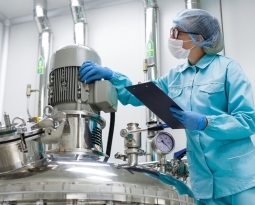UVM to Research Seaweed for Organic Dairy Cows
The University of Vermont’s (UVM) Sabrina Greenwood will head a multi-institutional research team. Her team at the Greenwood Lab have been awarded $2.9 million to explore the potential animal health, environmental and economic benefits of seaweed as a feed alternative for organic dairy cows. The grant comes from the USDA’s newly funded Organic Agriculture Research and Extension Initiative projects to help improve yields, milk quality and profitability for organic farmers and producers.
We’ve seen a rise in demand for organic milk recently and along with this rise in demand, instability in pricing. This has put a heavy strain on the organic dairy community. In addition, farmers have voiced concerns and struggles with climate change and a rise in demand to reduce the industry’s environmental footprint. Greenwood and her team think seaweed could be a key solution to some of these problems.
Seaweed is a nutritious alternative to traditional feed supplements which are made with corn and soybean. Seaweed also has the ability to reduce cow’s methane emissions. It can also be sustainable grown and offer benefits to soil health through altered manure profiles as the cows eat the seaweed.
“Teaming up with the aquaculture industry may be a perfect pairing to address organic farm sustainability and production efficiency in organic dairy,” said Greenwood, associate professor in the Department of Animal and Veterinary Sciences and the project director. “We are looking to holistically characterize the opportunities for organic seaweed to provide not only a more sustainable feed option, but one that could boost milk productivity and animal health without compromising natural resources.”
There are many different seaweed species, each with unique nutritional profiles and most which have not been studied. While kelp meal – a common brown seaweed – has become popular among organic farmers, other species may offer better benefits for cow health and milk productivity.
The team at UVM will spend the next four years working with Bigelow Laboratory for Ocean Sciences, the University of New Hampshire, and Syracuse University to explore the nutrient profile of various seaweed species, processing methods, and their impact on animal health, milk quality, and environmental impact.
Are you developing new software for an existing application? Did you know your development work could be eligible for the R&D Tax Credit and you can receive up to 14% back on your expenses? Even if your development isn’t successful your work may still qualify for R&D credits (i.e. you don’t need to have a patent to qualify). To find out more, please contact a Swanson Reed R&D Specialist today or check out our free online eligibility test.
Who We Are:
Swanson Reed is one of the U.S.’ largest Specialist R&D tax advisory firms. We manage all facets of the R&D tax credit program, from claim preparation and audit compliance to claim disputes.
Swanson Reed regularly hosts free webinars and provides free IRS CE and CPE credits for CPAs. For more information please visit us at www.swansonreed.com/webinars or contact your usual Swanson Reed representative.

















